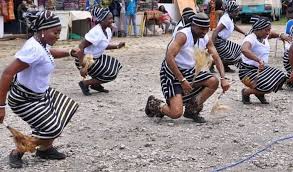OPINION
Tinubu and the Ajaokuta Steel Company Completion Challenge

By Martha Agas
The Ajaokuta Steel Company Ltd (ASCL) as the name implies, is located in Ajaokuta, in the north central state of Kogi, on 24,000 hectares of land was established in 1979 by the government of President Shehu Shagari.
It was meant to drive Nigeria’s modernity through industrialisation.
The steel plant is not just a rolling mill but an integrated iron and steel plant with about 43 units.By design, it has four rolling mills: the Billet Mills, the Light section Mill (LSM), the Wire Rod Mill and the Medium section and Structural Mill.
They are all envisaged to facilitate numerous socio economic benefits to the country and enhance the nation’s productive capacity through its integration with other industrial sectors.
This is in addition to serving as a means of saving and earning foreign exchange.
Besides supplying materials for infrastructure development, the plant is expected to produce 10,000 direct jobs in its first phase. The multiplier effect is projected to generate an additional 500,000 indirect jobs.
Before the Shagari administration was ousted by the junta in1983, it was 84 per cent completed and by 1994, it was 98 per cent completed.
However, the project could not continue due to a lack of funds, mismanagement and legal battles.
Unfortunately, what was meant to be Nigeria`s pride, 40 years later, remains in a comatose as efforts by past governments to complete its construction and resuscitate the then functional parts yielded no result.
While previous efforts and promises to resuscitate the plant may seems cliché, President Bola Tinubu`s assured that a significant difference would be seen before his tenure expires.
This aligns with his vision of the renewed hope agenda which has economic diversification as one of its major flanks.
The target is to grow the economy of Nigeria to more than one trillion dollars by the end of its first term.
When Tinubu took the helm of the nation`s affairs on May 29, 2023, he promised to remodel Nigeria`s economy to bolster growth and development.
He also said that his industrial policy would utilise the full range of fiscal measures to promote domestic manufacturing and lessen import dependency.
To achieve this feat, he embarked on reforms and initiatives aimed at rejuvenating the economy and promoting industrialisation in Nigeria.
However, for this to happen, the iron and steel industry must be priortised and fully developed because of its crucial role in achieving this feat.
The president emphasised the importance of a revitalised steel industry, as a catalyst for robust economic growth and a gateway to immense opportunities for Nigeria’s vast pool of talented entrepreneurs.
In line with this, the president established the Ministry of Steel Development in August 2023, to champion the vision and work on the improvement of all steel and metallic resources in the country for economic growth.
The ministry`s mandates include to resuscitate the Ajaokuta steel company and the National Iron Ore Mining Company (NIOMCO) Itakpe, and also to revive the steel industry.
The move is also in keeping to his campaign promise of resuscitating the Ajaokuta Steel Company by the end of his second term, aimed at creating 500,000 jobs to lift Nigerians out of poverty.
For a company that has been in comatose for 40 years, resuscitating it requires courage and political will which the Tinubu administration appears to have.
Experts estimate that a minimum of two billion dollars is required to resuscitate it.
Discussions with the original equipment builders of the steel plant, Russian company, Tyamzhpromexport (TPE) to complete the job they started 45 years ago are on-going.
Although the Chinese, Indian and Arab companies have indicated interest, to handle the job, the Russian consortium, comprising a team from Russia’s TPE/Rostec, Novostal, and Nigeria’s Proforce, are chiselling out a blueprint for the revival of the plant.
To demonstrate his commitment to the resuscitation, Tinubu appointed an indigene of Kogi, Prince Shuiabu Audu, as the Minister of Steel Development.
It is projected that his success would be a source of pride to Nigeria, and particularly to his kinsmen, whom he would not want to disappoint.
When Audu took office, he said the ministry would adopt a collegiate approach to reviving the plant by exploring all realistic means.
One of the approaches is a three-year roadmap of short and medium term plans.
Under the arrangement, due to the substantial amount involved, the units would be concessioned to investors with core competence to manage them.
At the ministerial sector update on the performance of the Tinubu`s administration, Audu said he directed that while navigating through resolving broader issues, the challenges that could be resolved in immediate term should be addressed.
In line with the directive, the minister set in motion the revival of the Light Mill Section (LSM) of the plant, projected to produce 400,000 metric tonnes of iron rods per annum.
These rods would be used for the construction of 30,000 KM of roads across the six geopolitical zones in the President`s first term.
This is part of the concrete road revolution of the renewed hope agenda of the president.
The construction is estimated to require seven million metric tonnes of iron rods over the four year period, about which Shuiabu mentioned talks have been held with the Minister of Works.
He added that Ajaokuta can produce 400,000 tonnes of it, and although it is a small amount, the president wants the company to supply some of the rods needed for Federal Government projects.
In realising this feat, the minister obtained presidential approval to raise private capital to restart the LSM.
“We are at the final stages of raising over N35 billion from a local financial institution, which is around 25 million US dollars to be able to restart the light section mill of the complex so that we can produce iron rods.
“The local financial institution has given us a final offer which I have done a cover letter and forwarded the relevant documents to the minister of finance to be able to take the financing on behalf of the federal government.
“This is through signed promissory notes that will be discounted and provided for the Ajaokuta mill to be able to get back on track in terms of the iron rods production.
“That light section mill has the capacity to produce up to 400,000 metric tonnes of iron rods per annum,“ he said.
He said that the Federal Government plans to establish Ajaokuta as a Free Trade Zone to attract Foreign Direct Investment (FDI) and to diversify the country`s economy.
“Part of the plan is to designate the 24,000 hectare land of Ajaokuta as an Industrial Park and create a Free Trade Zone to further attract Foreign Direct Investment’’, he said.
The second stage of the plant`s resuscitation involves producing military hardware.
The Federal Government has taken steps to begin the production of military hardware in the Ajaokuta Steel Complex, as the Ministries of Steel Development and Defence are set to sign a Memorandum of Understanding (MOU) for the implementation.
The plant has engineering workshops with the capacity to manufacture hardware for the military under the Defence Industries Corporation of Nigeria (DICON) Act.
Stakeholders observe that the move is timely, considering Nigeria`s enormous security challenges.
The minister mentioned that the Metallurgical Development Centre in Jos has the capability to provide the Lead and Zinc required to produce military hardware such as rifles, vests, helmets and bullets, among other things in the Ajaokuta Steel Complex.
While these stages are in motion, discussions have begun on reviving the 110 megawatt power plant in Ajaokuta, which can supply power not only to the plant but also to the national grid.
Due to the difficulties in securing funds to implement the plan, the minister is spearheading some initiatives for public-private partnerships.
In this framework, the asset would serve as collateral, enabling private investors to provide financing and expertise to rehabilitate the power plant.
The potential investors include Transcorp Power, Niger Delta Power Holding and Reticulated Global Engineering.
But while these efforts are on-going, there are myths surrounding the delay in the completion of the plant.
Leaders of Geregu and Ajaokuta, the company’s host communities, said in the past that the non-completion was due to mystical forces arising from the neglect of the communities.
They still live with the unfulfilled promises made to them of road construction and rehabilitation, the repair of their schools and other developmental projects. They say the gods must be pacified to make any tangible progress.
The Chairman of Geregu Community Association, Alhaji Idris Aliyu, said that the ancestors are not happy because the agreement reached when the company acquired their lands in 1976 has not been implemented.
He urged that their bad roads be fixed and schools repaired as promised.
While these claims may not be empirical, it is important that all necessary land compensation be fulfilled and basic amenities provided for the communities.
After decades of delay, will Tinubu deliver on his promise or will the long wait continue? (NAN Features)
OPINION
Coup in Guinea-Bissau and the Dilemma of ECOWAS

By Hakeem Jamiu
In his seminal work, Political Order in Changing Societies (1968), Professor Samuel P Huntington argues that political order is essential for societal development. He emphasises that strong, adaptable political institutions are necessary to manage conflicts and meet growing societal demands during periods of rapid change.
Huntington warns that failure to adapt swiftly to societal shifts often results in political decline and instability.
These insights offer a valuable perspective for analysing the recent palace coup in Guinea-Bissau, a country on the verge of greater unrest.Between 24 and 26 September, I was in Guinea-Bissau for the Economic Community of West African States (ECOWAS) pre-summit as the lead facilitator nominated by the Amandla Institute for Policy and Leadership Advancement (AIPLA).
During this time, I predicted that political upheaval was imminent. It was no surprise, therefore, when, on 26 November, a palace coup took place, leading to the forced evacuation of former President Goodluck Jonathan, head of the West African Elders Forum Election Observation Mission.
He described it as a “ceremonial coup,” an unusual act in which President Umaro Embaló himself announced the coup, despite claiming to be under arrest. This move was clearly staged to prevent the announcement of election results, ultimately undermining democracy in the country.
Embalo’s strategy to consolidate power began long before the coup. He had previously excluded his main challenger, PAIGC’s Domingos Simões Pereira from the electoral process, through judicial manipulation by the Supreme Court, which barred Pereira from contesting the election.
Pereira, a former prime minister, had supported the independent candidacy of lawyer Fernando Dias. Despite his official term ending on 27 February, Embaló remained in office, citing a different inauguration date.
His controversial decision to seek re-election, despite initial promises not to, prompted public protests, which were suppressed by force, with activists arrested and opposition movements restricted.
The road to Bissau, however, was not just fraught with political instability but also physical danger. As I journeyed from Zinguinchor to Bissau, a typically two-hour trip extended to eight hours due to the dilapidated roads, squeezed between rising rivers. The road was perilous, especially when we learnt of the armed insurgents operating along the route.
The driver, having initially misled us about the condition of the road, almost abandoned us at the Senegalese border. Fortunately, immigration officials ensured that we continued. Later, it was revealed that the road’s poor condition has been intentionally kept so as to prevent insurgents from reaching the capital easily.
The coup, led by General Horta Inta-A, just a day before the announcement of presidential election results, claimed that it was necessary in order to prevent “narcotics traffickers” from manipulating the election.
Both President Embaló and opposition candidate Fernando Dias claimed victory, with Dias seeking asylum in the Nigerian embassy, due to credible threats to his life. The people’s resolve for change had been underestimated by Embaló, who believed he could easily eliminate the opposition.
Despite the country’s dire economic situation, with deteriorated infrastructure and widespread poverty, the people of Bissau maintained a remarkable sense of joy.
Young men and women danced in the streets at 3 a.m., while others gathered at the hotel we stayed in, socialising late into the night. These youthful social gatherings reflect a society aware of global trends, including political unrest, despite being influenced by their leader’s poverty politics.
The summit, held at the Royal Hotel in Bissau from 24 to 26 September, focused on the future of ECOWAS, in its 50th anniversary. The theme, “Political Stability, Peace, and Security in West Africa,” seemed ironically prescient.
The dialogue, involving the civil society, youths, and security experts, examined the challenges facing ECOWAS, particularly Unconstitutional Changes of Government (UCG).
My prediction that Guinea-Bissau would soon face political turmoil was echoed by ECOWAS’ General Ojabo, who remarked that his troops were primarily tasked with “guard duties at the homes of politicians,” reflecting the mistrust between Guinea-Bissau’s political class and its military. “The minute ECOWAS pulls out of GB, there will be chaos,” he warned, a grim foreshadowing of what was to come.
The coup, led by General Horta Inta-A, just a day before the announcement of presidential election results, claimed that it was necessary in order to prevent “narcotics traffickers” from manipulating the election. Both President Embaló and opposition candidate Fernando Dias claimed victory, with Dias seeking asylum in the Nigerian embassy, due to credible threats to his life. The people’s resolve for change had been underestimated by Embaló, who believed he could easily eliminate the opposition.
This turned out to be a grave miscalculation, and the coup was a direct result of the president’s failure to meet the people’s expectations. As Huntington’s theory suggests, political instability often arises when rising societal expectations are unmet, leading to frustration and disorder.
The African Union (AU) has also suspended Guinea-Bissau from its activities, calling for respect for the electoral process. The United Nations has urged restraint and respect for the rule of law. The coup in Guinea-Bissau presents another challenge to ECOWAS’s credibility, especially as the region has seen an alarming rise in military takeovers. The coup belt, stretching across West Africa, is increasingly a source of concern.
ECOWAS, having strongly condemned the coup, has suspended Guinea-Bissau from its decision-making bodies and is advocating for the restoration of constitutional order in the country. Meanwhile, the African Union (AU) has also suspended Guinea-Bissau from its activities, calling for respect for the electoral process.
The United Nations has urged restraint and respect for the rule of law. The coup in Guinea-Bissau presents another challenge to ECOWAS’s credibility, especially as the region has seen an alarming rise in military takeovers. The coup belt, stretching across West Africa, is increasingly a source of concern.
Guinea-Bissau, with its fragile political and economic situation, faces considerable instability. With a population of only two million and a per capita GDP of $670, the country ranks among the poorest in the world. Around 70 per cent of the people live below the poverty line, with limited access to essential services such as healthcare, roads, education, and sanitation. As the political crisis deepens, there are concerns that drug trafficking could intensify, further destabilising the region.
For ECOWAS, the challenge is clear: it must persist in applying diplomatic pressure on the coup leaders to restore constitutional order. Military force alone is insufficient; what is needed is a sustained diplomatic strategy supported by respected statesmen.
ECOWAS needs to rediscover its role as a facilitator of West African peace, rather than as an end in itself. The organisation must act consistently and enhance its operational capabilities to tackle the root causes of instability. Unconstitutional changes of government are not merely political anomalies but symptoms of systemic governance failures that must be addressed to prevent further crises across the region. The time for action is now.
Hakeem Jamiu, an ECOWAS facilitator, writes from Ado-Ekiti.
OPINION
A silent Emergency: Soaring Costs of Diabetes Care Spark Alarm

By Folasade Akpan
For Mrs Schola Effiong, a 58-year-old confidential secretary in Calabar, managing diabetes in today’s economy feels like “climbing a hill that only gets steeper”.
Diagnosed in 2009, she said her monthly expenditure on insulin, tablets, laboratory tests and monitoring supplies now exceeds ₦150,000.
“You cannot stop taking the drugs, yet the cost keeps going up.
“Sometimes I do not have the money to buy some of them at the same time,” she said.
Her struggle mirrors the experiences of thousands of Nigerians at a time when experts warn that diabetes is becoming a major public health concern.
According to a 2018 national meta-analysis by Uloko et al.
, titled “Prevalence and Risk Factors for Diabetes Mellitus in Nigeria: A Systematic Review and Meta-Analysis”, Nigeria’s diabetes prevalence stands at 5.7 per cent, representing 11.2 million adults.The authors defined diabetes mellitus as a metabolic disorder of chronic hyperglycaemia caused by absolute or relative insulin deficiency and associated with disturbances in carbohydrate, protein and fat metabolism.
The study, which pooled data from numerous research works across the country, revealed wide regional disparities.
The prevalence rate was 3.0 per cent in the North-West, 5.9 per cent in the North-East, and 3.8 per cent in the North-Central, respectively.
The rates were higher in the southern part of the country: 5.5 per cent in the South-West, 4.6 per cent in the South-East, and 9.8 per cent in the South-South.
Experts say these patterns reflect changing lifestyles, rapid urbanisation and limited access to routine screening.
However, for many patients, statistics tell only a fraction of the real story.
Mr Offum Akung, a 57-year-old teacher in Cross River, said he had to ration his drugs because prices kept rising faster than his salary.
“I spend over ₦40,000 a month and still cannot buy everything on my prescription.
“I rely mostly on Glucophage now; when money allows, I add Neurovite Forte; diabetes management has become more difficult than the disease itself,” he said.
He appealed for government intervention, saying many patients were already “giving up”.
The Second Vice-President of the Diabetes Association of Nigeria, Mr Bernard Enyia, said the economic situation had pushed many Nigerians with diabetes into dangerous coping methods.
He said that he once managed his condition with about ₦70,000 monthly, but currently spends more than ₦180,000.
“Insulin has become something you pray for, while some people are sharing doses or skipping injections.
“Once you break treatment, the complications come quickly.”
Enyia, who lost his job as a health worker in 2017 due to frequent hospital visits, described the emotional toll as immense.
“It affects your finances, your social life, your marriage — everything. Many Nigerians with diabetes are quietly drowning,” he said.
Globally, concerns are also rising.
The World Health Organisation (WHO) estimates that more than 24 million adults in Africa are living with diabetes, a figure projected to rise to 60 million by 2050.
Marking World Diabetes Day 2025, WHO Regional Director for Africa, Prof. Mohamed Janabi, warned that rising obesity, lifestyle changes and weak health systems were fueling an “unprecedented wave of diabetes” across the continent.
He urged governments to prioritise access to affordable insulin, diagnostics and long-term care.
More so, pharmacists say they are witnessing the crisis firsthand.
The Senior Vice-President, Advantage Health Africa, Mr Adewale Oladigbolu, said many patients were no longer able to maintain regular medication schedules.
“People buy drugs today and skip them tomorrow because they do not have money.
“With non-adherence, they never reach therapeutic goals.”
Oladigbolu, a Fellow of the Pharmaceutical Society of Nigeria, said that locally manufactured metformin remained in high demand due to affordability, but insulin-dependent patients faced the harshest burden.
He stressed that diabetes care extended far beyond drugs.
“You need glucometers, strips, blood pressure monitors and regular tests.
“In countries where insurance work, patients do not think about the cost; in Nigeria, they pay for everything out of pocket,” he said.
He called for diabetes care to be covered under health insurance to reduce the financial burden on patients.
President of the Diabetes Association of Nigeria, Prof. Ejiofor Ugwu, described the rising cost of treatment as “a national crisis hiding in plain sight.
He said insulin, which sold for about ₦3,500 four years ago, presently costs ₦18,000 to ₦22,000 per vial.
“Test strips that were ₦2,000 now sell for ₦14,000, while glucometers have risen from ₦5,000 to over ₦25,000.
“On average, a patient now needs between ₦100,000 and ₦120,000 every month. Imagine earning ₦50,000 and being asked to spend twice that on one illness.”
He warned that between half and two-thirds of Nigerians with diabetes remain undiagnosed.
“We are seeing more kidney failure, more limb amputations, more blindness.
“These are late presentations caused by delayed or inconsistent treatment.”
Ugwu urged the Federal Government to urgently subsidise essential anti-diabetic medications and remove taxes on their importation.
“Most of these drugs are produced outside the country.
“Once you add import duties and other charges, prices become unbearable; subsidies and tax waivers could drop costs by at least 30 per cent,” he said.
He also called for expansion of the National Health Insurance Authority (NHIA) to cover a wider range of anti-diabetic medicines, glucose meters and strips — none of which are currently covered.
For many Nigerians, however, the struggle continues daily.
Across households, clinics and pharmacies, the message is the same: as Nigeria’s diabetes prevalence rises and treatment costs soar, more patients are slipping through the cracks — some silently, others painfully — while waiting for meaningful intervention.
In all, stakeholders say diabetes is a national emergency; people are dying quietly because they cannot afford medicine; hence the urgent need for relevant authorities to make anti-diabetic medications accessible and affordable.(NAN)
| ReplyReply allForwardAdd reaction |
OPINION
Is Community Parenting Still Relevant?

By Dorcas Jonah
In the Nigerian culture, extended families and communities play a crucial role in care-giving, instilling values, and supporting the development of children.
This cultural heritage of community parenting emphasises shared responsibility in raising children.
But in contemporary Nigeria, this age-long practice is facing enormous challenges due to modernisation.
In scrutinising this trend, some parents are of the view that community parenting helps in instilling morals and curbing social vices among children and youths, while others believe it is outdated.
Some parents are of the belief that their children are their responsibility; so they do not tolerate others correcting their children.
By contrast, others say that community parenting, when done with good intentions, can help raise a better society.
Mr Peterson Bangyi, a community leader in Dutse Makaranta, said that community parenting was the bedrock of raising a child.
He said the adage: “it takes a village to raise a child”, remained a powerful principle in contemporary society.
According to him, by Nigeria’s cultural norms and values, a child is owned by everyone; therefore, the grandparents, aunts, uncles, and neighbours actively contribute to raising children.
“This approach fosters a sense of belonging and ensures children grow up with diverse role models.”
Bangyi said that the extended families practiced by more communities were the backbone of parenting.
“But modernisation has taken away this practice as most families do not want people to come close to their children,’’ he said.
Mrs Monica Umeh, a mother of two, emphasising on the importance of community parenting, said that it played significant role in shaping her upbringing as a child and young adult.
Umeh advised that when correcting other people’s children, it is essential to do so with love and good intentions, without any form of bitterness.
“I am a strong advocate of community parenting as long as it is done with love and good intentions.
“I believe no parent can single-handedly raise a child without the support of others,’’ he said.
Mr Temitope Awoyemi, a lecturer, said that community parenting was crucial and could not be over-emphasised.
He said that community parenting helped society in inculcating strong moral values in children and youths, adding that modern life could be isolating for parents.
Awoyemi said that strong community support networks had been shown to lower parental stress levels and promote a more optimistic approach to raising children.
“It also ensures that a child receives guidance and correction from various adults, providing a broader, more consistent moral and social baseline that might be missed by parents who are busy with work.
“Community parenting encourages collaborative, interdisciplinary support from various community members and agencies in addressing a child’s developmental needs comprehensively.
“It focuses on prevention of long-term problems and celebrating individual strengths,’’ he said.
Awoyemi said that as the society continued to evolve, community parenting could adapt to ensure children benefitted from both cultural roots and contemporary innovations.
Mr Fortune Ubong, a cultural enthusiast, attributed the increasing crime rate in Nigeria to lack of community parenting that had extended to schools, and government institutions.
According to him, community parenting remains the foundation of every child’s moral upbringing.
“Most parents are now focused on earning a living and improving their lifestyle, in the process abandoning their primary duty of molding and guiding their children; this is where community parenting plays a greater role,” he said.
However, Mrs Joy Okezia, a businesswoman, said that given the recent developments in the country, correcting a child should be the sole responsibility of their parents.
Okezia said that she preferred to correct her children herself as she knew them better than anyone else.
She also noted that with the rising insecurity in the country, intervening to correct a child could pose a significant risk to the person.
Mrs Ijeoma Osita, a civil servant, also shared Okezia’s view, saying that a child’s behaviour was shaped by their family upbringing.
She said that if a child was not taught to love and respect others at home, an outsider would have little impact in correcting such a child.
Osita emphasised that parents should in still in their children the values of love and respect regardless of their status or background.
According to her, a child brought up with good values is less likely to misbehave well.
She cited the Holy Bible, saying, that says: “Train up a child in the way they should go, and when they are old, they will not depart from it’’.
Osita said that community parenting remained a vital aspect of Nigerian culture, promoting shared responsibility and resilience among families.
He opined that while modernisation posed challenges, blending traditional practices with modern strategies offered a promising path forward.
Observers say robust community connections are linked to better social-emotional development, academic achievement, and overall well-being for children.
They say that in modern society, amidst the digital world, economic instability, and busy work schedules, parents face pressures, making community support systems fundamental.
All in all, stakeholders are of the view that combining traditional community parenting with modern childcare – integrating technology, play-based learning, and skill acquisition – will produce well-rounded children.(NAN)

















